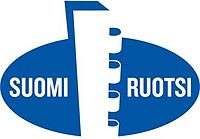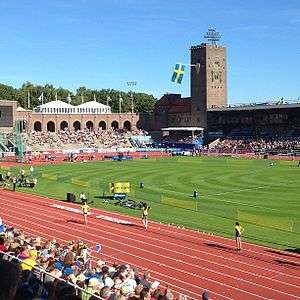Finland-Sweden Athletics International
|
Most recent season or competition: 2016 Finland-Sweden athletics international | |
 | |
| Sport | Athletics |
|---|---|
| Inaugural season | 1925 |
| No. of teams | 2 |
| Countries |
|
| Most recent champion(s) |
Men: Sweden Women: Sweden |
| Most titles |
Men: Finland (45) Women: Sweden (36) |
| Official website |
www www |
Suomi-Ruotsi-maaottelu (literally The Finland-Sweden match) or Finnkampen (Swedish, literally The Finn Battle), is a yearly athletics international competition held between Finland and Sweden since 1925.
It is, since the late 1980s, the only annual athletics international (with only two participating countries) still held at a professional level. The two-day event attracts significant audiences, with a combined total of over 50,000 tickets sold for the 2011 competition.[1] Three-time heptathlon world champion Carolina Klüft made her final international appearance for Sweden at the meeting in 2012.[2]
Competition

The competition is actually divided into two internationals, one for men and one for women. Youth competitions for men and women are also held. Each country provides their three best participants in each of the events, except for the relays where there are four participants (one team) from each country. Traditionally, the competitions have been arranged alternatively, with Finland hosting in even years and Sweden in odd years. This have changed few times in the later years, seeing one country arranging the international twice in a row a few times. The reasons for this include stadium renovations and major international competitions. Points are given to all contestants completing their event (no points are given to athletes who are disqualified, do not finish the event or don't get the result in field competitions), based on the final position in every event. Points given in each event are, from 1st to 6th place: 7-5-4-3-2-1, and in relays 1st and 2nd place are awarded with 5 and 2 points.
The competition may not be a world class one looking at the results, no single world record has been set, but there are few competitions in the world that are fiercer and more prestigious. This is most often seen in the middle-distance running, where tactics are more important than time, and these events have seen many foul tricks during the years, in 1992 resulting in the disqualification of all six runners in the men's 1500 metres event.
Another important aspect of the event is that it is a team competition. A competitor who manages to reach fourth place instead of a projected sixth place can be just as important, or even more important, for the end result as a "star" that secures the expected first place. A fight to the finish between competitor number five and six, half a lap behind the winner, can be just as important as the actual winner. The race is not over until the last competitor crosses the line. For many of the competitors the international is the most prestigious competition of the year.
The events in Finland have always been held in Helsinki, after 1939 at the Helsinki Olympic Stadium, but 2016 event will take place in Tampere Ratina Stadium. The Swedish events have mostly been held in Stockholm at the Stockholm Olympic Stadium. From 1999 until 2012 they were held in Gothenburg at the Ullevi Stadium because of larger spectator capacity.
Events
History

Finnkampen was held for the first time in Helsinki in 1925, with one of the participants being the five-time Olympic champion in the 1924 Summer Olympics, Paavo Nurmi. Competitions were held in 1927, 1929 and 1931. After a pause of eight years the next competition was held in 1939, just before the outbreak of the Second World War, which led to the cancellation of the competition between 1941 and 1944. The 1940 competition was held as a triple event between Finland, Sweden and Germany, with only two athletes from each country competing in each event. The international has been continually held for men since 1945 and for women since 1964, although the first women's competition was held already in 1953.
1931 breakup
The first competitions were very much influenced by the historical rivalry between Sweden and Finland. The 1931 event was a victory for Finland, but Swedish cheating on the track led to a knuckle fight between the runners-up in the 800 metres race.
Sweden also worked through IAAF channels to sabotage Finland's chances for victory. In 1931, Sweden attempted to manipulate the IAAF to disqualify one of Finland's most successful athletes. As a result, the new chairman of the Finnish athletics union and future president of Finland, Urho Kekkonen announced that Finland would no longer take part in the event. The tension was in a large part caused by Swedish attempts, spearheaded by Sigfrid Edström, the Swedish president of the IAAF and vice-president of the IOC, to have Paavo Nurmi declared a professional athlete, and thus banned from international competitions. After Kekkonen's speech Swedish abuse of their positions in the athletic bodies intensified to try to sabotage Finnish national success in other events as well, and Nurmi was banned from the 1932 Summer Olympics in Los Angeles.
It took eight years until 1939, before the Finns again decided to participate in the games, at the eve of the planned 1940 Summer Olympics in Helsinki. Sweden has never acknowledged nor apologised for their unsportsmanlike attitude and conduct in the games, on and off the field.
Results
| Year | Location | Winner (men) | Result | Winner (women) | Result |
| 1925 | Helsinki | 99–85 | – | – | |
| 1927 | Stockholm | 98–86 | – | – | |
| 1929 | Helsinki | 93–90 | – | – | |
| 1931 | Stockholm | 104–76 | – | – | |
| 1939 | Stockholm | 112–102 | – | – | |
| 1940 | Helsinki | 111–103 | – | – | |
| 1945 | Stockholm | 105–79 | – | – | |
| 1946 | Helsinki | 114.5–68.5 | – | – | |
| 1947 | Gothenburg | 106–78 | – | – | |
| 1948 | Helsingborg | 138–76 | – | – | |
| 1950 | Stockholm | 123–88 | – | – | |
| 1951 | Helsinki | 216–194 | – | – | |
| 1953 | Stockholm/Jyväskylä[3] | 217–193 | 58–48 | ||
| 1954 | Helsinki/Eskilstuna | 207–202 | 64–42 | ||
| 1955 | Stockholm/Valkeakoski | 213–196 | 58–48 | ||
| 1956 | Helsinki | 209–201 | – | – | |
| 1957 | Stockholm/Lahti | 208–201 | 64–42 | ||
| 1958 | Helsinki/Jönköping | 232–177 | 66–51 | ||
| 1959 | Gothenburg/Vammala | 209–200 | 64–53 | ||
| 1960 | Helsinki/Linköping | 216–194 | 67–50 | ||
| 1961 | Stockholm/Kouvola | 220.5–189.5 | 68.5–48.5 | ||
| 1962 | Helsinki | 219–190 | – | – | |
| 1963 | Stockholm | 220–190 | – | – | |
| 1964 | Helsinki | 210.5–199.5 | 64–53 | ||
| 1965 | Stockholm | 210–200 | 65-52 | ||
| 1966 | Helsinki | 208.5–199.5 | 62–55 | ||
| 1967 | Stockholm | 212–198 | 66–51 | ||
| 1968 | Helsinki | 208.5–199.5 | 64–52 | ||
| 1969 | Stockholm | 212.5–195.5 | 75–60 | ||
| 1970 | Helsinki | 227–182 | 82–53 | ||
| 1971 | Gothenburg | 224–183 | 71–64 | ||
| 1972 | Helsinki | 236.5–173.5 | 73–60 | ||
| 1973 | Stockholm | 223–187 | 77–69 | ||
| 1974 | Helsinki | 207–200 | 75–60 | ||
| 1975 | Stockholm | 214–191 | 94–62 | ||
| 1976 | Helsinki | 223–187 | 91–66 | ||
| 1977 | Stockholm | 212–194 | 86–69 | ||
| 1978 | Helsinki | 240–168 | 85–72 | ||
| 1979 | Stockholm | 214–194 | 80–77 | ||
| 1980 | Helsinki | 232–178 | 79–78 | ||
| 1981 | Stockholm | 214–196 | 81–75 | ||
| 1982 | Helsinki | 215–193 | 79–78 | ||
| 1983 | Stockholm | 234–176 | 83–74 | ||
| 1984 | Helsinki | 216–193 | 155–145 | ||
| 1985 | Stockholm | 219–185 | 166–156 | ||
| 1986 | Helsinki | 210.5–198.5 | 184–138 | ||
| 1987 | Stockholm | 210.5–197.5 | 165–157 | ||
| 1988 | Helsinki | 229.5–180.5 | 170–150 | ||
| 1989 | Stockholm | 213–197 | 184–138 | ||
| 1990 | Helsinki | 217–193 | 182–140 | ||
| 1991 | Stockholm | 226–183 | 197–147 | ||
| 1992 | Helsinki | 198–187 | 195–149 | ||
| 1993 | Stockholm | 215–192 | 198–144 | ||
| 1994 | Stockholm | 219–190 | 174–170 | ||
| 1995 | Helsinki | 213–196 | 196–146 | ||
| 1996 | Helsinki | 205.5–202.5 | 215–173 | ||
| 1997 | Stockholm | 207.5–198.5 | 223–165 | ||
| 1998 | Helsinki | 206–200 | 210–178 | ||
| 1999 | Gothenburg | 210–198 | 212–175 | ||
| 2000 | Helsinki | 216–194 | 219–191 | ||
| 2001 | Gothenburg | 218–185 | 213–197 | ||
| 2002 | Helsinki | 223–187 | 215.5–192.5 | ||
| 2003 | Helsinki | 205–203 | 208.5–201.5 | ||
| 2004 | Gothenburg | 217–191 | 228.5–178.5 | ||
| 2005 | Gothenburg | 212–197 | 230–179 | ||
| 2006 | Helsinki | 204–201 | 226–183 | ||
| 2007 | Gothenburg | 203–199 | 219–189 | ||
| 2008 | Helsinki | 215–193 | 209.5–197.5 | ||
| 2009 | Gothenburg | 208–200 | 213–197 | ||
| 2010 | Helsinki | 214–195 | 226–182 | ||
| 2011 | Helsinki | 206–194 | 225–182 | ||
| 2012 | Gothenburg | 220–187 | 223–187 | ||
| 2013 | Stockholm | 235–173 | 215–195 | ||
| 2014 | Helsinki | 216–193 | 206–204 | ||
| 2015 | Stockholm | 231–179 | 213.5–193.5 | ||
| 2016 | Tampere | 210–200 | 213–197 |
Totals
- Men:
- Women:
- Total:
References
- ↑ Sonninen, A-P (2011-09-12). Finland and Sweden share match victories in famous annual match. IAAF. Retrieved on 2011-09-17.
- ↑ Julin, A. Lennart (2012-09-03). Swedish men, Finnish women victorious in Gothenburg as Klüft takes final bow. IAAF. Retrieved on 2013-01-19.
- ↑ http://finnkampen.se/historik-och-fakta/41-2/
External links
- Finnkampen - Swedish site
- Ruotsi-ottelu - Finnish site
- The event at SVT's open archive (in Swedish)